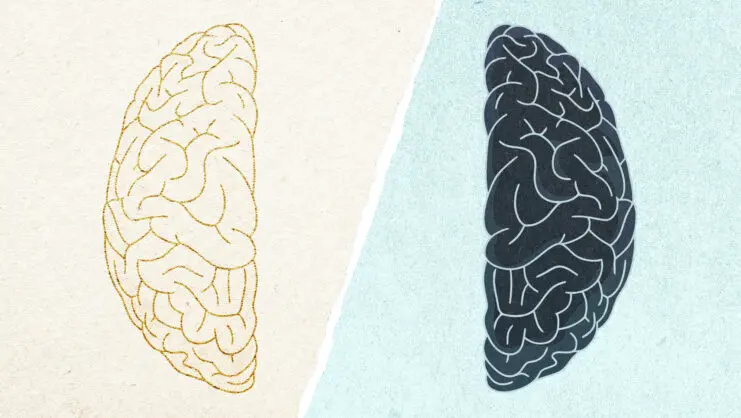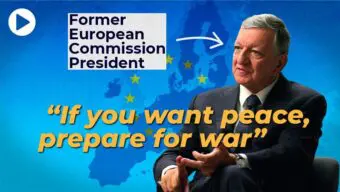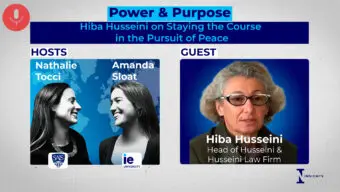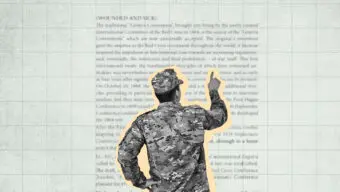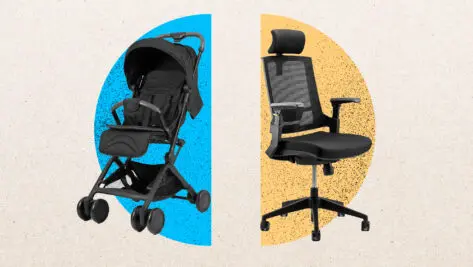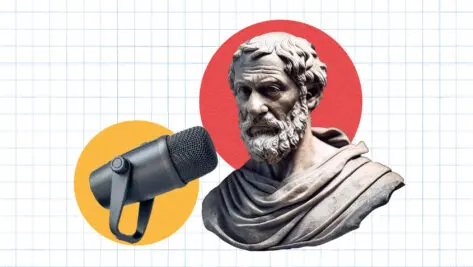An Introduction to Power & Purpose
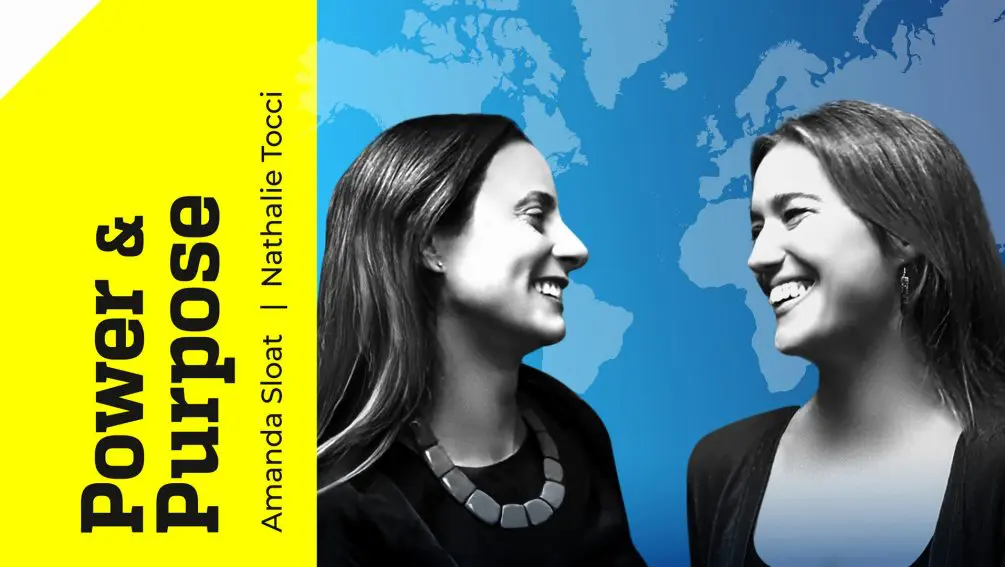
Power and Purpose kicks off with hosts Amanda and Nathalie laying out the show’s mission and swapping origin stories. Touching on their respective stints in Washington and Brussels, they reflect on burnout and balance (think yoga and kung fu), and touch on the perks and pitfalls of public service.
Extra Reading:
IE Center for Health and Well-Being
Unlocking the Power of Intuition in High Stress Jobs – Listen to Amanda discussing balance in high-stress jobs
My Path to Becoming – Nathalie’s Kung-Fu book
© IE Insights.
Transcription
Amanda Sloat
Professor, summer is over and it’s back to school time, which makes it the perfect moment to launch a new podcast as everyone settles into fall routines. Welcome to the first episode of Power and Purpose. I’m Amanda Sloat, a new professor at IE University in Madrid, Spain and former advisor to President Biden.
Nathalie Tocci
And I’m Nathalie Tocci and you, Professor at SAIS in Bologna, Italy and a former advisor to EU high representatives Federica Mogherini and Josep Borrell. So given the toxicity in politics these days, it’s easy to forget the people behind the headlines. So in this podcast, what we really want to do is explore the human side of global leadership.
Amanda Sloat
So Power and Purpose will feature conversations with former senior government officials and leaders exploring the people behind the headlines. But before we start interviewing guests, we wanted to use this first episode to introduce ourselves and answer some of our own questions. We come from opposite shores of the Atlantic, providing European and American perspectives. And in addition to being great friends, we followed a similar career trajectory as we both served at senior levels of our respective governments and institutions, worked in think tanks and are both starting new roles as professor of practice. So Nathalie, as we’re going to ask our guests how they got into policy, what was your journey getting in?
Nathalie Tocci
So my journey, Amanda was, as I think most journeys in some respects, a pretty random one. What was not random was that I think I, as a person, someone that has never really fully felt comfortable completely in the world of academia or completely in the world of practice. And I’ve always understood myself as someone really straddling these different worlds. So, in terms of how I actually got into the more policy side of things, as I said, I think it was a fairly random journey in the sense that when Federica Mogherini, who incidentally and I’m giving a bit of a spoiler here, will actually be our first guest on this podcast, when she was nominated High Representative of the European Union.
And I was previously when she was foreign minister, working with her in the Foreign Ministry for a while. And so it kind of was natural in some respects for me to move on and perhaps go and serve in her cabinet in Brussels. But because I’d actually lived in Brussels before and I wasn’t, to be honest, very keen on returning. I mean there are all sorts of also family personal reasons behind these choices as we’re going to be discussing.
Amanda Sloat
This and it rains all the time in Brussels.
Nathalie Tocci
All the time. So I really wasn’t keen on this at all. And so it was just one of these things where the heart said no, but the brain said yes and I didn’t quite know what to do. And then randomly at a conference, a colleague said to me, well actually that there are these roles of special adviser and it doesn’t actually require you to be in Brussels the whole time and you can be a little bit in and a little bit out.
And I said to myself, oh, that’s me, you know. And so I proposed it, to the newly appointed high representative at this stage. And she said, yes. And that’s how it all began. But how about you, Amanda? I mean, how does a girl from Michigan end up in the White House?
Amanda Sloat
Similarly random like you, I find your journey somewhat interesting because in the US and in Washington, I think it’s quite common for people to move in and out of government. If you go the political appointee track, rather than being a career diplomat or career official. And I know Europeans are sometimes envious of Americans for the ability to do that, because there definitely are times where it’s nice to be in government and serving and then it’s also nice to have times where you step back, catch your breath as you say, focus on family and other things.
And also, reset your brain then and do some reading and writing and thinking about things. You know, for me, I tell people I’m a poster child for how study abroad can change your life. I grew up in Michigan. Was not interested really in international politics. And then came between my third and fourth year university and spent a month in London a week in Edinburgh, fell in love with Scottish politics and then a PhD led to a postdoc and then eventually went back to the US, to try and serve my country and did stints in Congress at the State Department and then the White House, most recently. So really Europe has always been my passion. And it’s been exciting to be moving back to Europe now this year. But I want to talk to the people that have made a difference to the world and who can inform and encourage our listeners. I think both of us are going to be very conscious of that, dealing with students who are considering public service careers.
We obviously continue to have a lot of colleagues working in international relations who want to learn from the best and I think are very aware that there’s a lot of people right now who are cynical about politics and need a reminder of its better nature.
Nathalie Tocci
Totally. And in fact, we did call this podcast Power and Purpose precisely because we think that at its best, these are two sides of the same coin. You know, we really want to explore the connection between these things. What drives individuals, what drives them to contribute to, policy, to navigate power but also how they did this, by bringing in their own personal stories, their choices, their doubts. You know, what is the human side in the sense of holding these positions of power?
Amanda Sloat
Absolutely. So it’s going to be a great way for us to fangirl with a bunch of people that we really admire. Our plan is to launch new episodes every other week. And in each episode, we’ll interview a former senior government official leader, someone doing really interesting public service work, touching on current political events at the beginning, because obviously there’s a lot going on and our guests are going to have a lot of expertise but also really getting to know the people rather than the job titles. And we will ask guests to reflect on their successes and failures, how they stayed healthy in their high stress jobs and what it takes to lead during moments of uncertainty.
Nathalie Tocci
And perhaps one further thing that we should say at this point is that what we also want to do in this podcast is focus in particular on women and women leaders and the role that they have played in international relations. So this is not a women only podcast, because we will now and then invite some men as well. But I would say that it’s a women mainly podcast, because we really feel that there is still insufficient but obviously, thankfully, a growing group of absolutely extraordinary women that have made incredible contributions to policy and to international relations. And so we really think that their stories are still insufficiently known. And knowing them can actually help us understand both about the past, present and future but also to provide a real insight to listeners as to how to look at power and purpose as two sides of the same coin.
Amanda Sloat
Absolutely. I’m curious with everything you mentioned and all of the things you’ve done, is there a moment or an achievement that stands out to you that you’re most proud of?
Nathalie Tocci
Well actually, something we share, one of the many things that we share, is indeed Europe is my passion, too. And I guess my proudest moment in that respect is the work that I did on the European global strategy. So this was when I was special adviser to Federica Mogherini. And the EU hadn’t had basically a security strategy for a long time in the sense that the previous one, which had been the first and only one was written back in 2003 and back in 2003, as the opening lines of that strategy said Europe had never been so prosperous so secure or so free. And by the time we get to 2014, 2015, well, very clearly we weren’t very prosperous, after the Eurozone crisis, we weren’t very secure after the annexation by Russia of Crimea, and terrorism in Europe. And I mean, the freedom bit, it was beginning to crack there, too, with the rise of populism across the continent and, of course, in the United States as well.
And so it really felt important to have a new document that the member states and EU institutions could agree on to, in a sense, provide a compass for the way forward. And so I proposed to the High Representative that we work on such a document. And she agreed. And and essentially that’s what I did when I was special advisor. And here we are in 2025, there has not been another EU global strategy. I mean so it’s still 10 years on, the one that survives and a number of concepts in that document, including resilience, big focus on defense, in many respects still relevant or perhaps even more relevant today. So I guess that’s one of the things that probably stands out most, to me but how about you?
Amanda Sloat
I was going to ask how much of that stands the test of time? You could make the case that Europe is showing questionable resilience with the further invasion of Ukraine, rising populism. How does that document look now?
Nathalie Tocci
Yeah. I mean in many respects, obviously the world has changed tremendously. Right. But in terms of what is it that we have to do as Europeans about it in some respects, you could say, well, the point is that it was precisely about not so much resilience, meaning we are resilient but resilience, meaning we have to become resilient. And we’re not sufficiently resilient or we’ve got to invest more on defense. So it’s as if what is in that document precisely because it’s not as if it wasn’t done. It simply wasn’t done enough. And of course, the change of the context means that it has to be done on steroids. And the deterioration of that context that in some respects makes it still relevant today. But, I mean, tell me a little bit about your passion about Europe. Looking at this from the other side of the Atlantic, what was your proudest moment, perhaps as is relevant to transatlantic relations?
Amanda Sloat
Yeah, I know it’s a great question. You know, I think in terms of documents produced when I was in Congress, I passed one piece of legislation and it gave diplomatic immunity to officials serving in the international organizations in Bosnia and the office of the High Rep. And then also in the ICR in Kosovo. So that was something I felt really proud of because it actually made a tangible difference to officials working there and protected them from political attacks or being sued. On a very personal level, my proudest moment was being in Belfast, Northern Ireland, with President Biden. He had long wanted to visit Ireland, his family homeland. He had been a passionate defender of Northern Ireland. Northern Ireland was a place I randomly landed in 2001 to do my postdoc, it was the only place I could get a job.
Nathalie Tocci
I didn’t know that. So you did your postdoc in Northern Ireland?
Amanda Sloat
I did, it was the only place I could get a job. I did my stage in Brussels. I wanted to work in Brussels but I was an American who only spoke English and needed a work permit, which did not make me a particularly competitive candidate. So I ended up in, in Northern Ireland and I moved there before, one week before 9/11. My mother, everybody was very nervous about my safety in Northern Ireland. 9/11 happened, and nobody again worried about me in Northern Ireland. But it was only a couple of years after the Good Friday Agreement. Still lots of security issues on the ground. And so Northern Ireland became a bit of a passion project for me over the subsequent years.
I really got emotionally invested in the place. I did a lot of work on the impact of Brexit on Northern Ireland when I was out of government during the first Trump administration. And so to be there with President Biden marking the anniversary of the Good Friday Agreement really was a full circle moment for me. It brought me back to this first job I had coming out of school. It brought me back to a place I cared about. And also was positive to see the region moving in a much better trajectory. So, like I said, Northern Ireland was a place that I never expected to live but it really ended up shaping, in many ways, the next 20 years of my career in terms of academic and political work that I did.
So I’m curious if you had similar things that you didn’t expect or things that were negative at the time or detours that ended up being positive in the end?
Nathalie Tocci
Well in an odd kind of way, I guess the unexpected detour was the product of the fact that for me, actually, everything went far too much according to plan. So I’ve been always sort of fairly hard working, sort of a big sense of responsibility. “Oh my God, I’ve got to save the world” kind of person. And I was really like this, since a very young age and things worked out. What do I mean by things worked out a little too well? In the sense that I literally had a very full agenda with never really having any time out in terms of whatever: gap years or what have you.
And so things worked out a little too well to the extent that I kind of really drove myself into the ground and ended up, and this was about eight, nine years ago, so not too long ago, ended up with an absolutely dreadful burnout. And I think that burnout was precisely the product of the fact that things had worked out up until then, far too well. And so I never really had, in a sense, that little blank space in which the unexpected can happen. And so actually, it was a product of that burnout that I changed really rather significantly the way in which I go about my work. So I still kind of work on the same things. I still have the same passions but now I take a lot more time out for myself.
In particular, I take a lot more time out to do things that are not related to work. Like my martial arts, for example. So, yeah, I guess my unexpected turn was the product of things being a little bit too expected. And I’m grateful that eventually, the unexpected happened. But how about you, Amanda? I mean, have you had moments in which there was that unexpected detour, things didn’t quite work out how you had planned and all sorts of new opportunities emerged as a result of that.
Amanda Sloat
Yeah, I really related to what you were saying on the burnout piece, another area where you and I have followed very similar trajectories. And I think really when I start talking to a bunch of my girlfriends, I realize we’re all very Type-A and working too hard and I am going to say, you told me just before we started this podcast, you were screeching in from the airport off a conference. And I think both of us still have those Type-A tendencies in us, even though we’re trying to do better. But no, I think I had a very similar experience. I’ve taken three sabbaticals now following my government jobs. When I left Congress, I took a period of time off when I left the State Department, following really intense work in the Obama administration where I was responsible for U.S. policy on Turkey at a time of the war in Syria, the rise of ISIS, the refugee crisis. I needed time off to reset. And then the most dramatic one has come following my three years in the White House. And I had gone into that job with really good intentions to try and stay healthy. You know, I was going to do yoga every morning. I was eating really healthy food. I was trying to get enough sleep at night.
But the reality is, as well, these government jobs are very intense and very stressful and I had a resting heart rate of 98 beats per minute when I left the White House. Which when the doctor told me that it just was symptomatic of how jacked up I felt all the time. And like you, I also never took a gap year. I went straight from undergrad to my PhD to intern to postdoc. And I missed all the fun that our students, seem to be having now. And so, a year ago, I bought myself a one-way plane ticket, flew to New Zealand and spent, a year just traveling, which really was a fantastic opportunity to reset, to process a lot of things, to develop healthier habits, to have fun exploring the world. And then all of that ended up leading me to this job in Spain. And I think, like you, at least with the intention of having a calmer existence or at least a better sense of work-life balance. So I know that you have been dealing with your stress through kung fu, which makes you, I think, one of the most badass people I know. So how did you get into it? I’ve never actually heard the story of how you got into kung fu.
Nathalie Tocci
The real story goes as follows. I was 11 years old, and I got a terrible crush on a guy.
Amanda Sloat
Always the way.
Nathalie Tocci
And he did judo. And so I thought to myself how is it that I can get noticed? And so I just kind of thought, I’ve got to do judo as well but there was no judo, basically, near my home, there was only taekwondo. So I actually started off my martial arts with taekwondo, which I did until after the end of my university. So I did taekwondo for about 10, 15 years. And I was quite serious.
Amanda Sloat
Wait but what happened with the boy? Did you get noticed?
Nathalie Tocci
I completely lost interest. I took a lot of interest in taekwondo.
Amanda Sloat
Yeah, moved on to better things.
Nathalie Tocci
So it kind of fades out of my memory at this stage. But he obviously doesn’t know, I hardly remember his name, he very clearly played a very significant role in my life.
Amanda Sloat
Amazing.
Nathalie Tocci
So I was kind of very serious about my taekwondo. But taekwondo is a lot about kind of kicking, kicking, kicking. I mean, the whole competitive side of things, which of course, when you’re in your teens and early 20s, it’s a lot of fun. And actually, it’s fun even when you’re in your kind of late 40s, as I am now, in the sense.
Amanda Sloat
You got more things you want to kick at.
Nathalie Tocci
I was in Thailand with my son last month and we went and did Muay Thai, a Thai boxing camp, which was a lot of kicking and punching. Anyway so back to taekwondo. I did that, as I said, for about 10, 15 years. And then by the time I got into my mid 20s, I was into kind of sort of learning something that was a little bit more, how can I put it, more comprehensive, less focused exclusively on the external side of things. And basically that’s what Kung-Fu is. There are internal styles of kung fu. Like tai chi, and probably tai chi is the one that most people are more familiar with, which actually is kung fu, that are really very close to meditation and yoga. And as I went on in life, I just kind of thought, I need that side of things as well.
And today my kung fu and my practice is really a way for me to sort of find those blank spaces and it’s in those blank spaces but ultimately new ideas, new inspirations or simply just kind of switching off really happens. So I think for everyone, for me, it’s martial arts, for some people it’s walking. But everyone, I think, really does need to have that kind of little secret garden, for oneself.
Amanda Sloat
Totally, totally.
Nathalie Tocci
So, so important. And I know your little secret garden Amanda, is yoga.
Amanda Sloat
That I know, I know my not-so-secret. And I should also tell listeners who know you for your profound writings in international newspapers that you also have a book on kung fu, which we will have to link in the show notes. If you have inspired anyone to take up the practice. No, absolutely. For me it was yoga and somewhat similar. I did gymnastics when I was little like, like every American child of my age, I was going to be the next Mary Lou Retton and compete in the Olympics, and then I started to have injuries. And the rest and then left that path but still really enjoyed standing on my head and doing backbends. And so yoga has sort of been gymnastics for adults. And I’ve really found it a way to not only with the physical practice, maintain a sense of flexibility and exercise, but really appreciated a lot of the Zen and the calm and and the focus that comes along with that.
And so have continued to do yoga on a regular basis. During the pandemic, I started a daily ten-minute practice every morning. I would love to do an hour every morning. But I knew, especially during my White House days, that was not going to be realistic. But ten minutes in the morning, there’s lots of excellent resources online. Is very doable. And often it’s the best part of my day, where I just start, in a very calm and focused way. You know and I want to give a short plug, actually, to IE University that’s established a Center for Health and Well-being, to help students develop awareness and skills. You know, I think certainly for me and correct me if I’m wrong but I assume for you this just wasn’t something that was really talked about when we were in university. This sense of work-life balance and and health. And I think it’s something you and I want to get into on this podcast and talk about with leaders: how they’ve managed it. All of us I think could use a little more yoga and kung fu in our lives.
Nathalie Tocci
As you say, I think it’s one of the primary reasons why we’re doing this podcast hopefully, many of our listeners will actually be much younger than us. And looking into how to explore a career in policy and practice. And, what broadly speaking would be your top advice to them, looking ahead?
Amanda Sloat
Yeah. So I’ve now had my first class. So I have gotten over my back to school nerves and met with my students for the first time. And I have to say I was concerned about how they would be viewing the world, given how toxic politics are. And so I was quite heartened that the vast majority of students in my classes are interested in international relations and in some form of public service. I have to say, not a lot of them were interested in serving as elected representatives. But there was a lot of interest in the nonprofit sector in diplomacy and in ways of really trying to understand and connect and and engage people. And one of the biggest pieces of advice that I have given students in the past and I think it’s really reflected in both of our experiences, is just staying open to different opportunities.
You know, my dad used to say to me: “Sometimes it’s as important to work out what you don’t want to do as it is what you do want to do.” I certainly never expected to go to Northern Ireland. It was a dream to be in the White House. I had not envisioned myself living in Spain. I foolishly stopped studying Spanish when I was in university. And I think you just don’t know where life is going to take you. And so I think you need to be prepared to be the right person in the right place at the right time. And get the education, have the experiences. But I think you really need to stay open to the randomness and the beauty of the world. Because you just never know where some of your career trajectory is going to lead. So what are you going to tell your students?
Nathalie Tocci
I mean, Amanda, I think it’s actually rather similar to what you just said in the sense that, I mean, I keep on coming back to this image of the blank spaces. I used to have a doctor who was actually more of a philosopher, to be honest, than a doctor. He once said to me: “Naturally, you’re like a painting full of color. There are no blank spaces, on this tableau.” And it’s all color, color, color, color. And you just need to carve out that white, you know. You need to carve out those blank spaces and it’s only once there are those blank spaces that you can figure out whether you want to keep them white or whether you want to paint them in red, green or blue. But if everything is absolutely crammed with color already, you actually think that you’re making choices but the choices are actually being made for you. And so I think the flip side of the coin of remaining open means providing yourself with that space to actually make choices. So, I guess my main advice at times is doing less at times ends up meaning doing more. And that’s how you, to the extent possible, provide a steer to your life while remaining open to its unpredictability, I guess.
Amanda Sloat
You know, I love that. I love that idea of blank spaces, it’s beautiful. Well, you and I obviously could continue talking for hours and hours in this podcast. And we’ll have the opportunity to do that with our guests in the future. So just to bring it back to the podcast I think to put it very simply, we want to share stories about people who have inspired us. And and so we’ve tried to provide a little bit of our stories here in this first episode. You know, in addition to providing a peek behind the curtain, we hope that this podcast reminds listeners that purpose-driven leadership remains possible. And in a world that’s filled with so much political polarization, wars and economic difficulties, it’s also important to focus on the positives. You know, I found when I talked to friends back in the US, it’s very easy to exchange stories about challenges and problems that we’re facing. But a friend of mine recently, in one of our conversations said to me, what brought you joy this week? So, Nathalie, as we are wrapping up, what brought you joy this week?
Nathalie Tocci
You know, actually, I’ve just come back from holiday. I was as I told you, in Thailand and then Laos and Vietnam. And what brought me joy, actually, just a couple of days ago, because I was still in Vietnam, was a train journey back from Sa Pa and northern Vietnam to Hanoi, where I had my return flight. And I ended up having a long conversation with a lady that was actually traveling from Sa Pa to Hanoi for the national celebrations. Vietnam has its Independence Day on the 2nd of September. And so obviously, Vietnam is a country that has gone through, frankly speaking, quite a lot of s**t over the last couple of centuries. I mean, wars left, right and center, total devastation. And this was not an intellectual. She was not a policy wonk in any shape or form. But we ended up having this rather deep conversation about how at some point you really need to turn a page on the past and and look ahead and get over resentments and as I said, this wasn’t an intellectual conversation.
And so it’s not really a reflection about government and Vietnam or what have you but it’s really something. And the lady is just one example but I got the same sense from cab drivers and tourist guides and whatnot about a people that have really turned a page on the past and are really looking to the future with a lot of optimism and hope and joy. Right? I mean, going back to the question about joy. So that gave me a lot of joy listening to her talk to me. But what about you, Amanda?
Amanda Sloat
No, that’s that’s amazing. I had a very similar experience. I went the opposite direction from you for my holidays. I was in Southwest Africa and did a three-week overland trip. Spent a lot of time in Namibia, which if listeners are looking for vacation destinations, I can highly recommend. Spectacular, sunrise at the dunes, Safari seeing animals. And like you, I had the opportunity to engage in a lot of really meaningful conversations with local people. I spoke to a Herero woman in Namibia. I spent an afternoon hanging out with two women working in a cafe in Swakopmund exchanging stories about dating advice and how dating works in Namibia and comparing American men and Namibian men.
And then, like you, I was in Cape Town and I did a tour of one of the townships because I really wanted to understand the history there and and how things were progressing. And I ended up being alone on this walking tour. And the guide was really lovely. He kept jokingly putting his hand on my arm to slow me down, because even on vacation, my inclination was to power ahead and walk but he would link his arm through mine and say he wanted to walk his friends and he wanted to walk through the township, including with a white foreign woman, to show the people there that it is possible to continue healing and to continue moving forward. And so, like you, it was a great opportunity to get away from my area of focus and study to explore another really beautiful part of the world and to engage with some really lovely, lovely people.
Nathalie Tocci
Amazing.
Amanda Sloat
Well thank you to all of our listeners for joining us. We will be back with our first full episode very soon, featuring an inspiring woman leader, which, if you were listening closely to Nathalie, you may have gotten a hint, with great stories and lessons learned. Nathalie and I are both very excited about our growing list of amazing people that we plan to feature on future episodes.
Power and Purpose is an IE Insights podcast, produced in association with IE University and Johns Hopkins School of Advanced International Studies. Production and Sound Design by Reptile Studios. We’ll be back soon with the next episode. Make sure you never miss an episode by subscribing to Power and Purpose wherever you get your podcasts.
